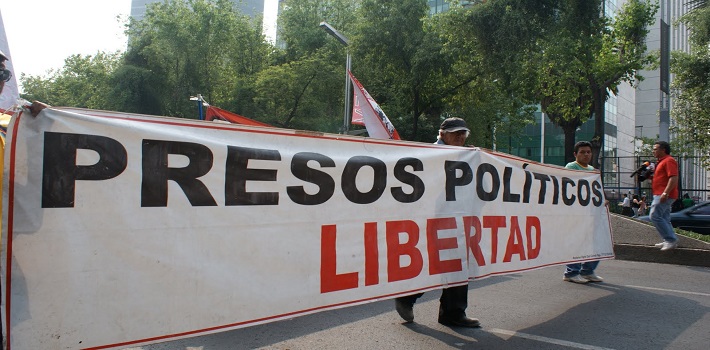
EspañolAmid rampant inflation, shortages, and social unrest, Venezuelan human-rights activist Virgina Zamora became worried that the public would soon forget about the country’s political prisoners.
That is why she launched #LiberenALosPresosPolíticos (Free the Political Prisoners), a campaign that features all those who have been persecuted by the Venezuelan regime, but who time may have forgotten.
The Popular Will activist tells the PanAm Post that she wants to remind Venezuelans who the political prisoners are: their names, their cases, and how they arrived at their current circumstances.
“Prisoners began turning into numbers; they no longer have names. These are Venezuelan citizens who are going through very unfair trials,” she laments.
Peor que ser presos políticos de la DICTADURA es además ser presos de la indiferencia de sus compatriotas… pic.twitter.com/jCz4x0qNFi
— Virginia Zamora Santana (@VirginiaZamora) October 2, 2015
“Worse than being the dictatorship’s political prisoners is being prisoners to the indifference of their compatriots.”
“I’m not saying they are guilty or innocent; that is a decision for a fair court to make, not a court that only rules in favor of what the government wants,” Zamora says.
She highlights the cases of Lorent Saleh and Gabriel Valles, who remain locked up in “The Tomb,” a cluster of prison cells five stories underground that do not meet international human-rights requirements. The government has deferred their preliminary hearings 17 times, which means they have been jailed for over a year without trial.
She also quick to remind those who listen about Antonio Ledezma, the mayor of Caracas who is under house arrest and has had his preliminary hearing postponed six times.
“A country with political prisoners, food rationing, lack of security and housing; where you cannot speak your mind; where media outlets are shut down; this is not a democracy. To me, this is a totalitarian regime. We are living in a modern, 21st-century dictatorship, in which all our freedoms are curtailed,” she vents.
The Forgotten
The Nicolás Maduro regime arrested political-activist Araminta González one year, two months, and seven days ago. She was scheduled to attend court for her preliminary trial on Friday, October 1, but the government delayed the hearing once again.
Prosecutors initially charged González with terrorism, but they dropped those charges in September due to a lack of evidence. Now, they accuse her of criminal conspiracy, criminal association, and incitement to violence, pointing to ties with Vasco Da Costa, a political scientist who is currently being held for allegedly leading a terrorist organization. González, however, insists she does not know Da Costa.
#2O -> Araminta Gonzalez 1 año y 70 días injustamente tras las rejas de la DICTADURA en #Venezuela. TORTURADA. pic.twitter.com/W13W2HCozL
— Virginia Zamora Santana (@VirginiaZamora) October 2, 2015
“Araminta Gonzalez: one year and 70 days unjustly behind the bars of the Venezuelan dictatorship. Tortured.”
José Vicente Haro, her lawyer, claims González has been tortured in prison. He filed a complaint with evidence of the attackers, but says he’s yet to receive a response from the Venezuelan judiciary.
José Pérez Venta and Carlos Trejo initially accused González of the crimes the government has filed against her. According to her lawyer, she met Venta and Trejo in July 2014, and allowed both men to stay at her apartment as a favor to a friend. After a few days and several disagreements, she kicked them out.
González’s attorney says Venta and Trejo stole the keys to his client’s house, so Araminta threatened to report them to the police. The men then allegedly told González that they knew people at the national police’s forensics unit (CICPC) that could send her to jail. A couple days later, the CICPC arrested and allegedly tortured González.
In August 2014, Venezuelan journalists reported that Venta and Trejo were involved in the murder of Liana Hergueta. Police found Hergueta’s body dismembered in a car.
Araminta’s case is just one of many in Venezuela. According to the Venezuelan Penal Forum, there are currently 78 political prisoners in Venezuela, of which 62 are civilians.
Of those in jail, 31 are behind bars for demonstrating against the government. Venezuelan police have so far arrested nine dissidents for opinions expressed on Twitter. The rest were detained for various other reasons, including some dating as far back as the April 11, 2002 protests.
[adrotate group=”8″]
Furthermore, the Venezuelan police have arrested more than 3,000 political activists since February 2014. Authorities have since released the majority of these individuals, but have required that they check in periodically.
Such is the case with 68-year-old Josefa González, whose husband, Rodolfo “The Aviator” González, reportedly committed suicide while in custody. González died without ever knowing the evidence against him.
“Inhumane Conditions”
José Vicente Haro, constitutional lawyer and human-rights advocate, tells the PanAm Post that most political prisoners in Venezuela are held in “inhumane” conditions. While much of the media has focused exclusively on opposition leader Leopoldo López, Haro argues the government is several prisoners in far worse conditions.
The expert says that many Venezuelan prisons are overcrowded. In tiny cells meant for five, Haro claims authorities hold 40 to 60 detainees.
He says that Venezuelan jails treat political prisoners like common criminals, and flagrantly violate international standards, such as the Principles and Best Practices on the Protection of Persons Deprived of Liberty, which all OAS member states are obliged to observe.
According to the lawyer, the Venezuelan judiciary has postponed most preliminary hearings on purpose. “They are serving a sentence without having been tried,” Haro claims.
On Thursday, September 30, the Venezuelan Penal Forum reported that 17 political prisoners still remain locked up in regular prisons.
Haro says the Maduro administration does not care to guarantee the safety or health of these detainees. He adds that while no country should hold political prisoners, such detainees should “not receive inhumane treatment, as if they were common criminals.”
 Versión Español
Versión Español












